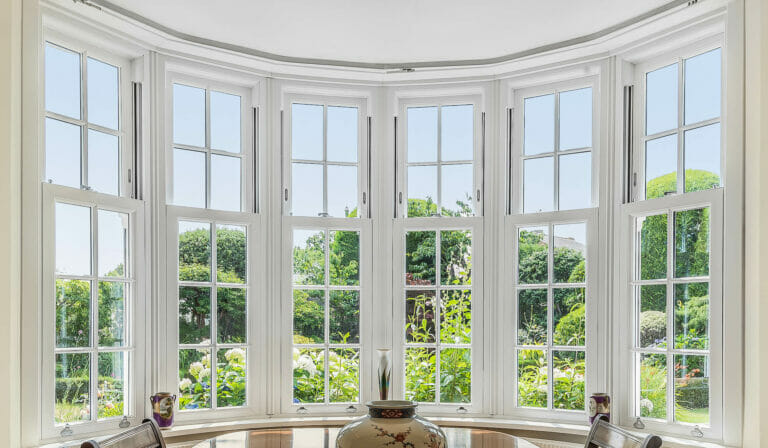Quick FAQs
[rank_math_rich_snippet id=”s-d4131cd7-106f-4c3f-b041-49e97fc2739a”]
When it comes to choosing the right material for windows and doors, safety is a top priority.
In the UK, fire safety regulations are stringent, and homeowners want to ensure that their properties are equipped with materials that offer protection in case of a fire. One common material used for window and door frames is uPVC (unplasticized polyvinyl chloride).
But are uPVC frames fire-resistant?
In this article, we’ll look into the advantages and limitations of uPVC frames that homeowners and builders should be aware of, in the context of fire resistance.
How uPVC frames perform in fires
Whilst uPVC frames are not completely fireproof, they do offer a high level of fire resistance due to the properties of the material.
Tests conducted by the British Plastics Federation, to ascertain uPVC’s reaction to fire hazards, have shown that it is difficult to ignite and that once the ignition source is removed, no residual flame remains on the product. The limited burning of PVC-U is confirmed in a variety of other standard fire tests, which measure specific parameters such as the rate of heat release and flame spread under different conditions.
The conclusions of the tests are that:
- The rate of heat release and the total heat released by uPVC are significantly lower than most organic building materials.
- When flames impinge on uPVC, it forms a protective char which restricts the burning zone.
The fire resistance of glazed PVC-U window frames is generally found to be similar to that of glazed wood window frames.
The overall conclusion of the tests was that uPVC frames present a satisfactory performance in fires.
Advantages of uPVC Frames in Terms of Fire Resistance
Limited Combustibility
uPVC is considered a limited combustibility material. This means that when exposed to fire, it will not readily catch fire or support the spread of flames. It has a high ignition temperature and does not contribute significantly to the fire load of a building.
Self-Extinguishing
uPVC has a property of self-extinguishing, which means that if it does catch fire, it will stop burning once the flame source is removed. This is an important safety feature.
Low Smoke Emission
uPVC produces minimal smoke when exposed to fire. Smoke inhalation is a major cause of fatalities in fires, so low smoke emission is advantageous in terms of fire safety.
Limitations of uPVC Frames in Terms of Fire Resistance
Softening and Deformation
While uPVC doesn’t readily catch fire, it can soften and deform when exposed to high temperatures. This can affect the structural integrity of the frame and may lead to the failure of the window or door.
Limited Fire Endurance
uPVC frames have limited fire endurance, which means they may not withstand prolonged exposure to intense heat. In the event of a severe fire, they may eventually fail.
Compatibility with Fire-Rated Glazing
When it comes to fire-rated windows and doors, uPVC frames may not be the ideal choice. Fire-rated glazing systems often require frames made of materials with higher fire resistance, such as steel or aluminium.
Enhancing uPVC Fire Resistance
To enhance the fire resistance of uPVC frames, certain additives and fire retardant treatments can be applied during the manufacturing process. These treatments can improve the material’s ability to withstand fire and heat.
In conclusion, are uPVC frames a safe choice?
In summary, uPVC frames do offer some degree of fire resistance, particularly in terms of limited combustibility, self-extinguishing properties, and low smoke emission. However, they have limitations in terms of softening, deformation, and limited fire endurance.
Staying safe
When it comes to buildings with specific fire safety requirements, such as commercial or public properties, it’s essential to consult with building professionals and consider alternative frame materials that meet the necessary fire regulations.
For residential properties, uPVC frames can provide adequate fire resistance, but homeowners should also invest in other fire safety measures, such as smoke detectors, fire extinguishers, and an escape plan, to ensure the safety of their households in case of a fire emergency. Regardless of the material your window and door frames are made from, you should always evacuate a property in the event of a fire.

